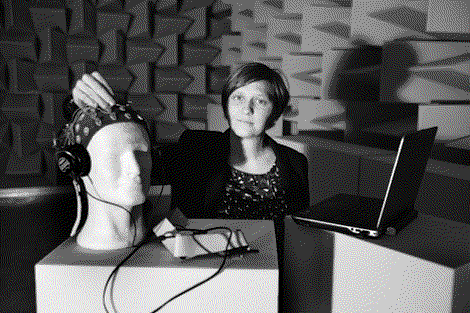Sarah Verhulst - ROBSPEAR
Prof. Dr. Verhulst is Associate Professor in Hearing Technology and joined Ghent University in 2016. She has a background in electrical and acoustical engineering and received her PhD from the Technical University of Denmark in the topic of cochlear mechanics and otoacoustic emissions. After post-doctoral training at Boston and Harvard University (computational auditory neuroscience), she became Assistant Professor in physiology and modeling of auditory perception at Oldenburg University.
In the Hearing Technology lab at UGent, she adopts an interdisciplinary approach to study sound encoding in the normal and impaired auditory system. Physiological methods (EEG and otoacoustic emissions) are combined with computational modeling of the auditory periphery to study how different aspects of peripheral hearing loss (cochlear synaptopathy/hidden hearing loss and outer-hair-cell loss) interact and affect sound perception.
Our interdisciplinary approach to hearing science is unique and able to yield novel and sensitive hearing screening methods as well as efficient hearing restoration strategies. We furthermore focus on integrating novel EEG technologies in wearables and design realistic noise-exposure guidelines for an ever-growing ageing and noise-exposed society.
Contact: S.Verhulst@UGent.be - waves.intec.ugent.be/hearing-technology
Publications: Sarah Verhulst on google scholar
Robust Speech Encoding in Impaired Hearing (RobSpear)
The prevalence of hearing impairment amongst the elderly is a stunning 33%, while the younger generation is sensitive to noise-induced hearing loss through increasingly loud urban life and lifestyle. Yet, hearing impairment is inadequately diagnosed and treated because we fail to understand how the components that constitute a hearing loss impact robust speech encoding.
A recent and ground-breaking discovery demonstrated the existence of a noise-induced hearing deficit -cochlear neuropathy- that coexists with the well-studied cochlear gain loss known to degrade the audibility of sound. Cochlear neuropathy is thought to impact robust encoding of the audible portions of speech and occurs before standard hearing screening methods indicate problems, implying that a large group of noise-exposed people with self-reported hearing problems is currently not screened, nor treated. To design effective hearing restoration strategies, it is crucial to understand how cochlear neuropathy interacts with other hearing deficits to affect robust speech encoding in every-day listening conditions.
Using an interdisciplinary approach, RobSpear targets hearing deficits along the ascending stages of the auditory pathway to revolutionize how hearing impairment is diagnosed and treated. RobSpear can yield immense reductions of health care costs through effective treatment of currently misdiagnosed patients and studies the impact of noise-induced hearing deficits on our society.
